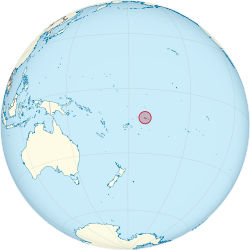Western Samoa
|
Independent State of Samoa Malo Saʻoloto Tutoʻatasi o Sāmoa
|
|||||
|---|---|---|---|---|---|
|
|||||
|
Motto: "Fa'avae i le Atua Sāmoa"
"Samoa is founded on God" |
|||||
 |
|||||
| Capital and largest city |
Apia 13°50′S 171°45′W / 13.833°S 171.750°W |
||||
| Official languages | |||||
| Ethnic groups (2001) |
|
||||
| Demonym | Samoan | ||||
| Government | Unitary parliamentary democracy | ||||
| Tufuga Efi | |||||
| Tuilaepa Aiono Sailele Malielegaoi | |||||
| Legislature | Legislative Assembly | ||||
| Independence from New Zealand | |||||
| 14 June 1889 | |||||
| 16 February 1900 | |||||
| 1 March 1900 | |||||
| 30 August 1914 | |||||
|
• League mandate
|
17 December 1920 | ||||
|
• UN trusteeship
|
13 December 1946 | ||||
|
• Western Samoa Act 1961
|
1 January 1962 | ||||
| Area | |||||
|
• Total
|
2,842 km2 (1,097 sq mi) (174th) | ||||
|
• Water (%)
|
0.3 | ||||
| Population | |||||
|
• November 2016 census
|
192,342 | ||||
|
• Density
|
68/km2 (176.1/sq mi) | ||||
| GDP (PPP) | 2016 estimate | ||||
|
• Total
|
$1.046 billion | ||||
|
• Per capita
|
$5,368 | ||||
| GDP (nominal) | 2016 estimate | ||||
|
• Total
|
$876 million | ||||
|
• Per capita
|
$4,496 | ||||
| HDI (2014) |
high · 105th |
||||
| Currency | Tala (WST) | ||||
| Time zone | UTC+13:00 (UTC+13b) | ||||
|
• Summer (DST)
|
UTC+14:00 (UTC+14) | ||||
| Drives on the | leftc | ||||
| Calling code | +685 | ||||
| ISO 3166 code | WS | ||||
| Internet TLD | .ws | ||||
|
|||||
Coordinates: 13°35′S 172°20′W / 13.583°S 172.333°W
The Independent State of Samoa (Samoan: Malo Sa 'oloto Tuto 'atasi o Sāmoa, IPA: [ˌsaːˈmoa]), commonly known as Samoa (Samoan: Sāmoa) and, until 1997, known as Western Samoa, is a unitary parliamentary democracy with eleven administrative divisions. The two main islands are Savai'i and Upolu with four smaller islands surrounding the landmasses. The capital city is Apia. The Lapita people discovered and settled the Samoan islands around 3,500 years ago. They developed a unique language and cultural identity.
Samoa is a member of the Commonwealth of Nations. Western Samoa was admitted to the United Nations on 15 December 1976. The entire island group, which includes American Samoa, was called "Navigator Islands" by European explorers before the 20th century because of the Samoans' seafaring skills.
The oldest date so far for remains in Samoa has been calculated by New Zealand scientists to a likely true age of circa 3,000 years ago from a Lapita site at Mulifanua during the 1970s.
...
Wikipedia


